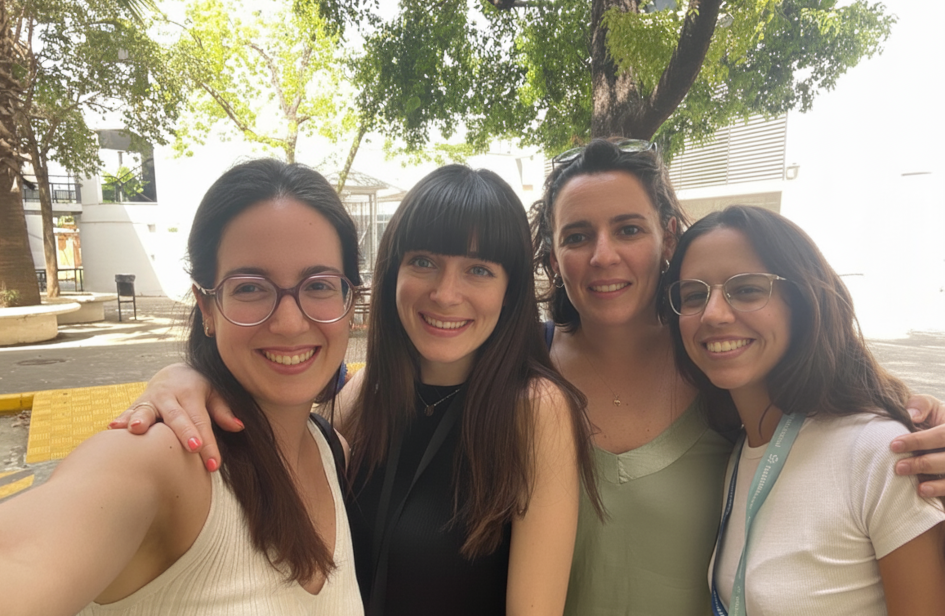
Group photo. From left to right, Cristina Andrés Gil, Rocío de la Encarnación Fernández-Fernández, María Antonia Sánchez Romero and Rocío Carvajal Holguera
Group description
Our group (Epibact Lab) is dedicated to unveiling the non -genetic mechanisms that allow bacteria to adapt to environmental changes and develop resistance to antibiotics. We put a particular emphasis on the role of bacterial epigenetics and phenotypic heterogeneity, in order to understand bacterial survival strategies and identify new targets to combat antibiotic resistance. To do this, we use epigenomic approaches and at the individual cell level to unravel the “Secret Survival Skills” of bacteria.
Research lines
Our research addresses fundamental issues such as:
- What non -genetic mechanisms use bacteria to adapt and resist antibiotics?
- What environmental signals trigger changes in bacterial epigenetic brands?
- Is it possible to manipulate phenotypic heterogeneity to increase susceptibility to antibiotics?
- How knowledge of the epigenetic base of phenotypic heterogeneity can lead to the development of new strategies against antimicrobial resistance?
Currently, our main lines of research are:
- Study of non -genetic mechanisms involved in bacterial adaptation to environmental changes and antibiotic resistance: We seek to understand cellular responses at the individual cell level against environmental stimuli and the presence of antibiotics, highlighting the role of phenotypic heterogeneity. To do this, we use individual cell techniques such as microencapsulation, microscopy and flow citometry.
- Interpretation of the epigenetic landscape (dNA methylation role) in bacterial adaptation and antibiotic resistance development: Our goal is to elucidate the role of bacterial epigenetic mechanisms, especially DNA methylation, in susceptibility to antibiotics and the ability to adapt to hostile environmental conditions. This includes the identification and characterization of epigenetic modifications.
- Genomic and epigenomic analysis of antibiotic resistance in clinical isolated: We use genomic databases and third generation sequencing technologies (Nanopore and SMRT) to identify genetic mutations and epigenetic modifications associated with antibiotic resistance in isolated bacteria of clinical environments.
- Development of new therapeutic strategies aimed at non -genetic resistance to antibiotics: We evaluate new therapeutic interventions to fuel bacteria to existing antibiotics and overcome the quick resistance challenges.
Scientific dissemination
In our group we are firmly committed to scientific dissemination and public awareness of the problems of antibiotic resistance. We actively participate in events such as the European Researchers' Night, Quifibiomat, Pint of Science and we are instructors in the MicroMundo@Sevilla program that promotes scientific vocations in the fight against antimicrobial resistance.
We have developed innovative educational resources, including a Virtual Microbiology Laboratory, and we contribute to the international project IMiLI (International Microbiology Literacy Initiative) to improve the global understanding of microbiology. We also work in the gamification of education with projects such as “Farma-Boom”.
Featured posts
- Fernández-Fernández R, Olivenza Dr, Weyer E, Singh A, Casadesús J, and Sánchez-Romano Ma (2024) Evolution of a Bistable Genetic System in Fluttuing and Nonfluctuing Environments. Proc Natl Acad Sci USA 121:e2322371121. https://doi.org/10.1073/pnas.2322371121
- Sánchez-Romero Ma, and Casadesús J (2020) The Bacterial Epigenome. Nat Rev Microbiol 18:7–20. https://doi.org/10.1038/s41579-019-0286-2
- Sánchez-Romero Ma, Oliveza Dr, Gutiérrez G, and Casadeús J (2020) Contribution of DNA THAT ADINE METYLUTION TENESETERETERETERETERETETYO in Salmonella enterica. Nucleic Acids Res 48:11857–11867. https://doi.org/10.1093/nar/gkaa730
- Sánchez-Romero MA, Cota I, and Casadesús J (2015) DNA methylation in bacteria: from the methyl group to the methylome. Curr Opin Microbiol 25:9–16. https://doi.org/10.1016/j.mib.2015.03.004
- Sánchez-Romero MA, and Casadesús J (2014) Contribution of phenotypic heterogeneity to adaptive antibiotic resistance. Proc Natl Acad Sci USA 111:355–360. https://doi.org/10.1073/pnas.1316084111
